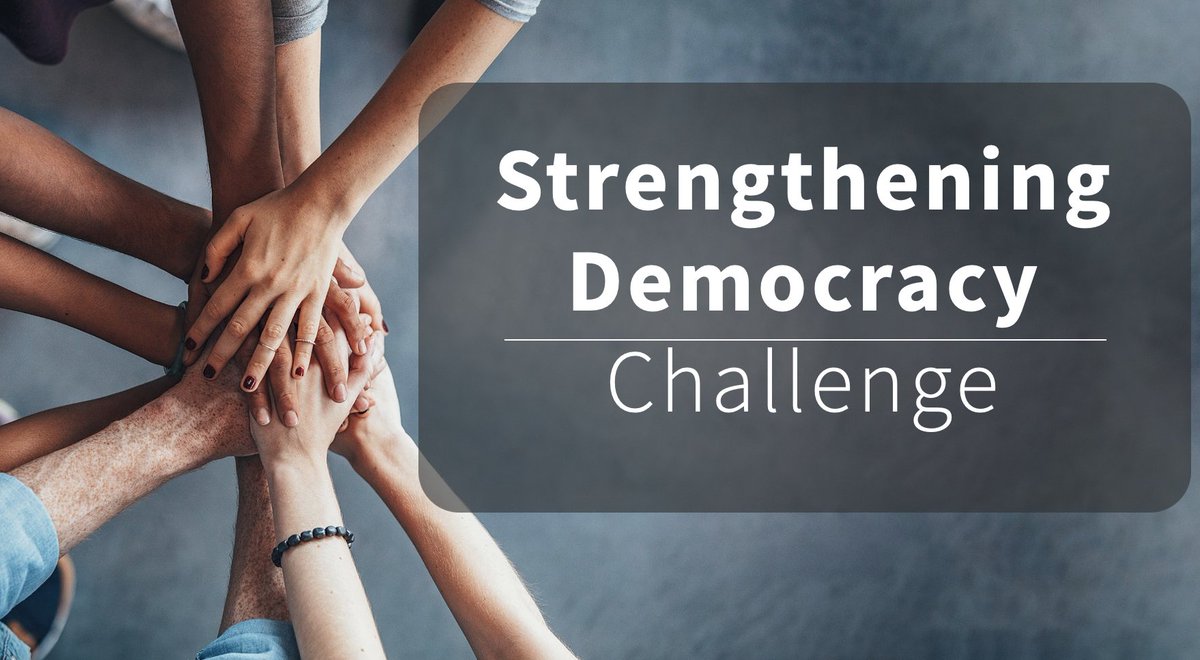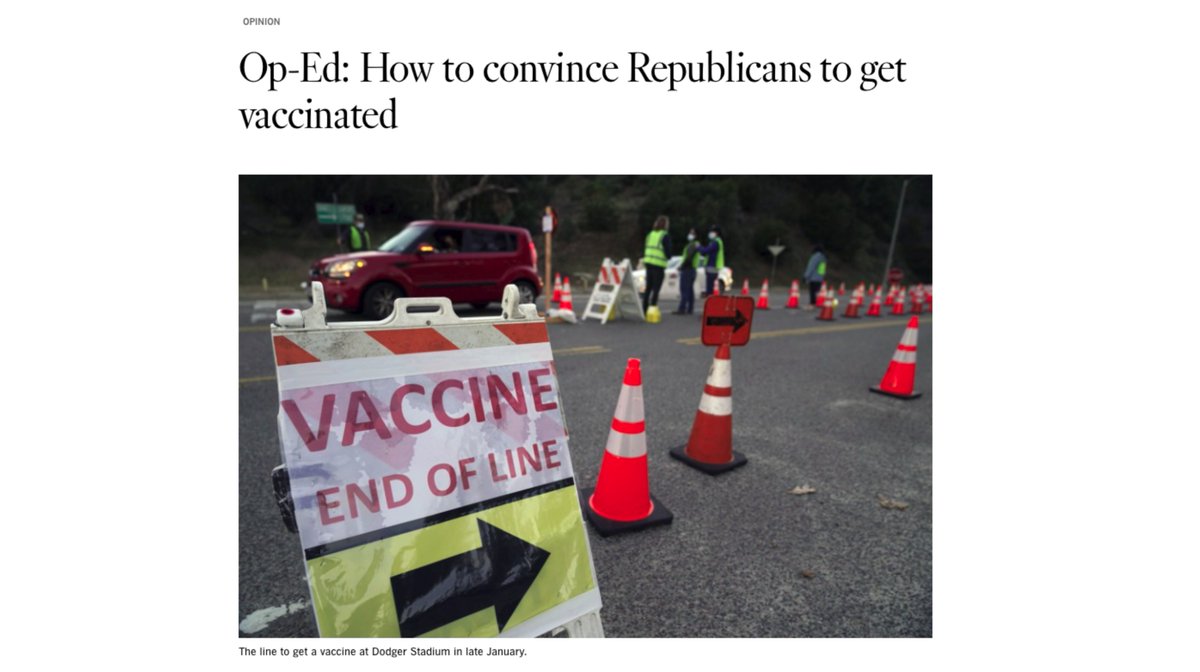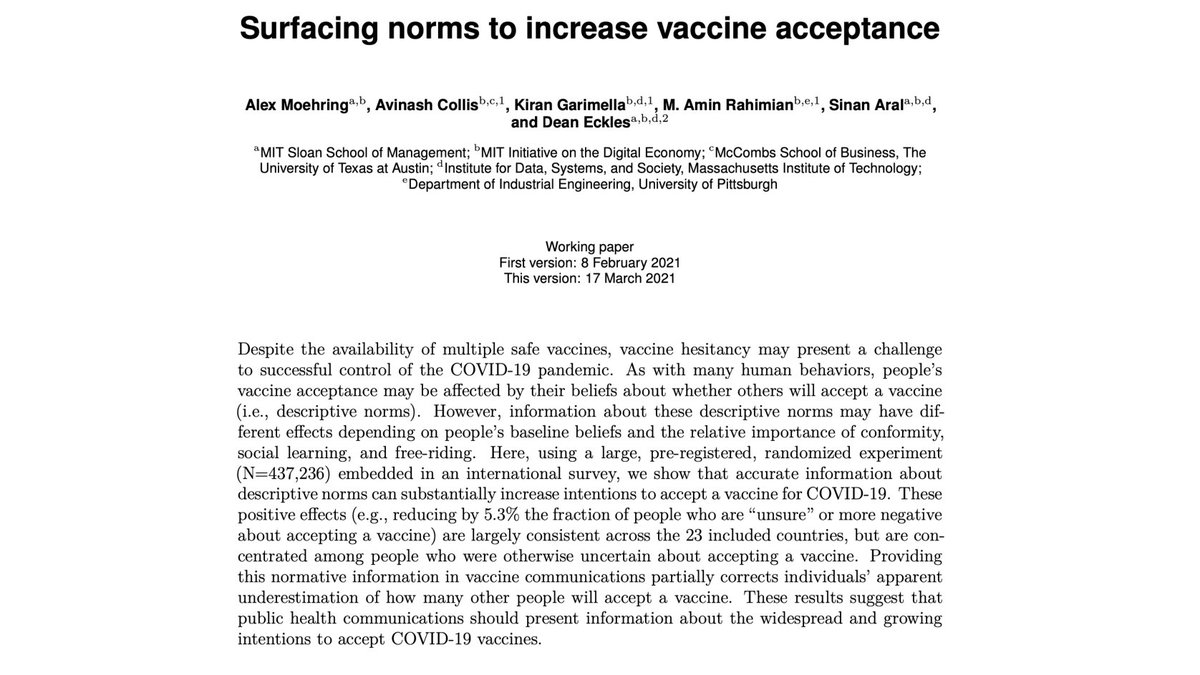
🚨New WP: How can we reduce partisan animosity & anti-democratic attitudes in US?🚨
We share results of the Strengthening Democracy Challenge: N=32k megastudy testing 25 depolarization interventions
Shows effective treatments for many neg outcomes!
🧵👇strengtheningdemocracychallenge.org/paper



We share results of the Strengthening Democracy Challenge: N=32k megastudy testing 25 depolarization interventions
Shows effective treatments for many neg outcomes!
🧵👇strengtheningdemocracychallenge.org/paper




In line with claims that American democracy is in crisis, we found concerning baseline levels of potentially problematic attitudes, e.g.:
➤Partisan animosity
➤Support for undemocratic practices
➤Support for undemocratic candidates
➤Biased evaluation of politicized facts

➤Partisan animosity
➤Support for undemocratic practices
➤Support for undemocratic candidates
➤Biased evaluation of politicized facts


We test 25 interventions to reduce such attitudes, submitted by social scientists & practitioners. Most targeted partisan animosity, but many also aimed to reduce support for undemocratic practices or partisan violence. Walk-through of interventions here👇
https://twitter.com/RobbWiller/status/1558973819842203648?s=20&t=AU1I9rKIT-Lh_IkRVO496Q
Our results reveal that the efforts of those interested in reducing partisan animosity have yielded an impressive base of knowledge. 23 interventions reduced partisan animosity, often sizably (up to 10pts on a 100-pt scale), across survey and behavioral indicators, and durably. 
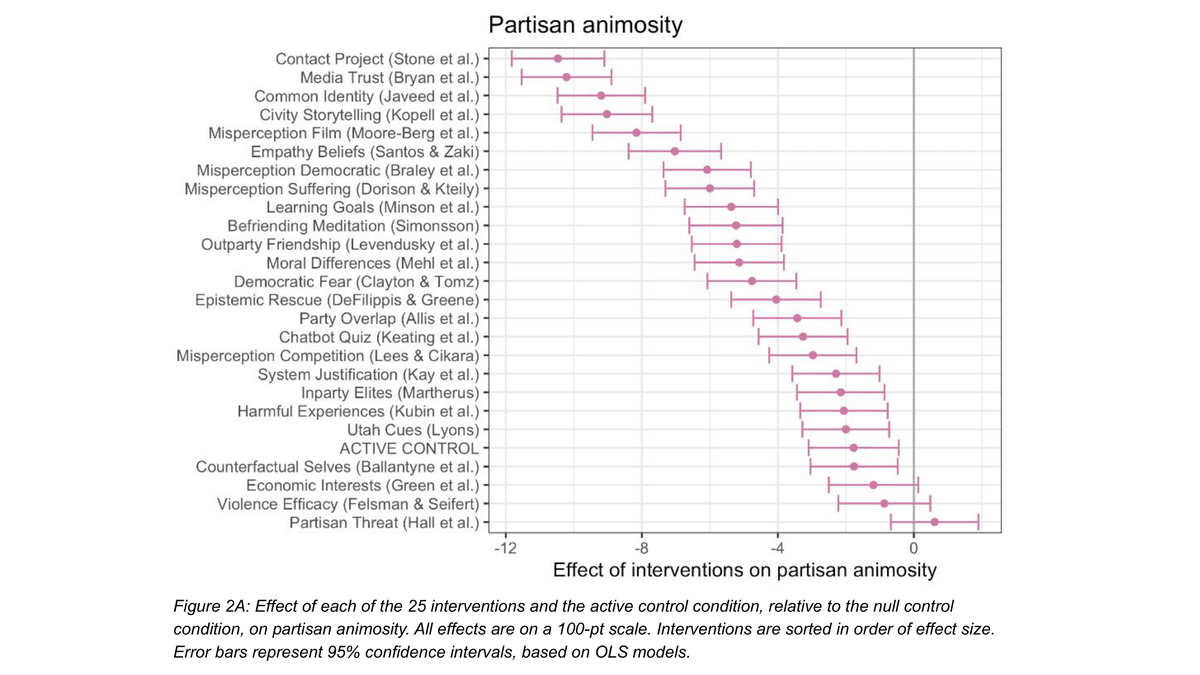
We also find promising interventions that yield significant improvements for each of the other potentially problematic outcomes we examine - although effects on these outcomes were generally less common, smaller, and less durable than for partisan animosity. 
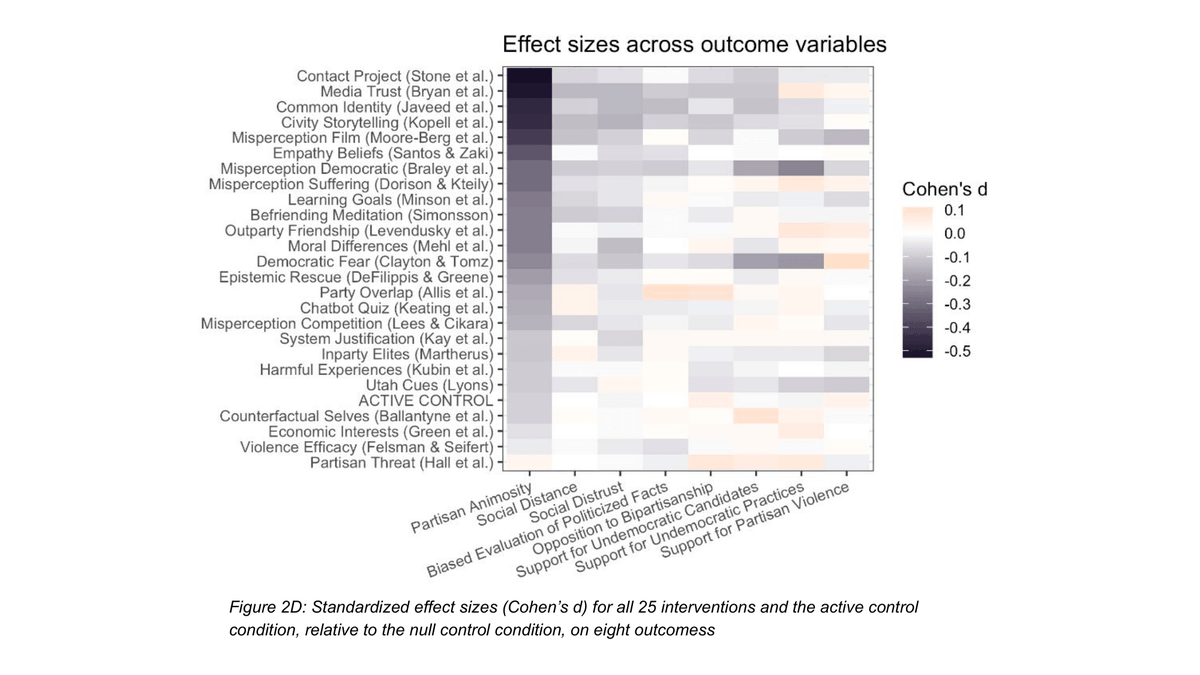
For example, we found evidence that six interventions reduce support for undemocratic practices. Reducing misperceptions about outpartisans’ anti-democratic attitudes and highlighting the disastrous consequences of democratic collapse were the most promising approaches. 

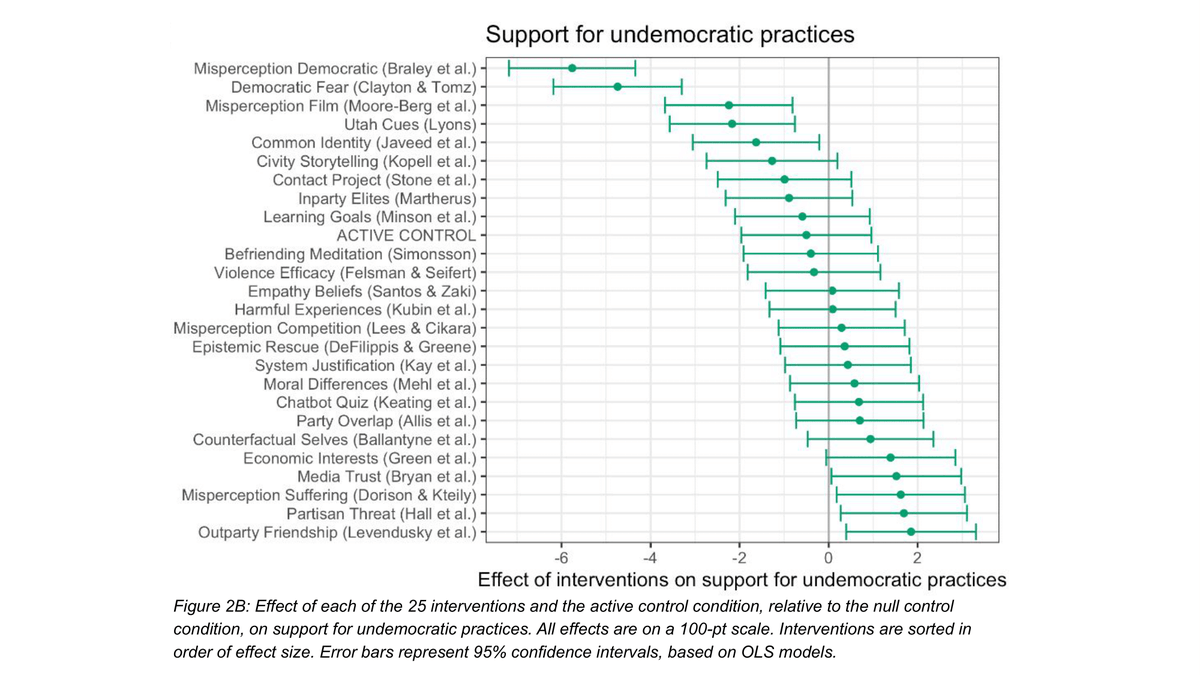
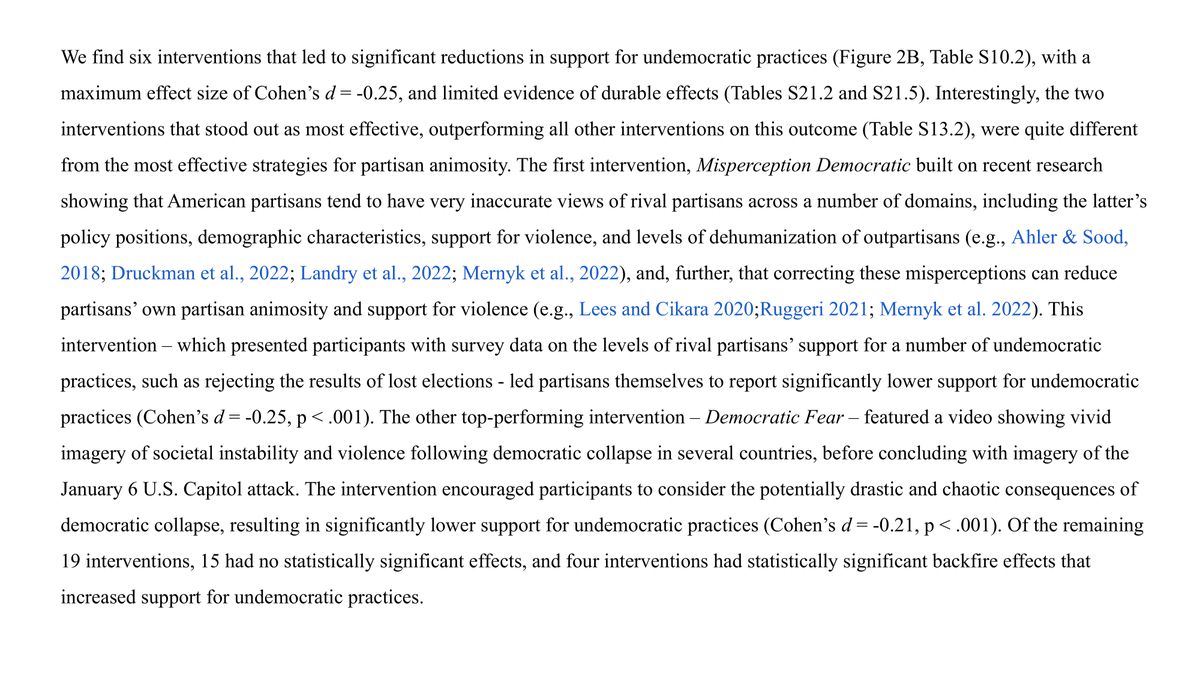
We also found five interventions that significantly reduced support for partisan violence. Engaging videos showing partisans’ reactions to misperception corrections and a joint pro-democratic statement by Utah’s candidates for governor in 2020 were most effective. 

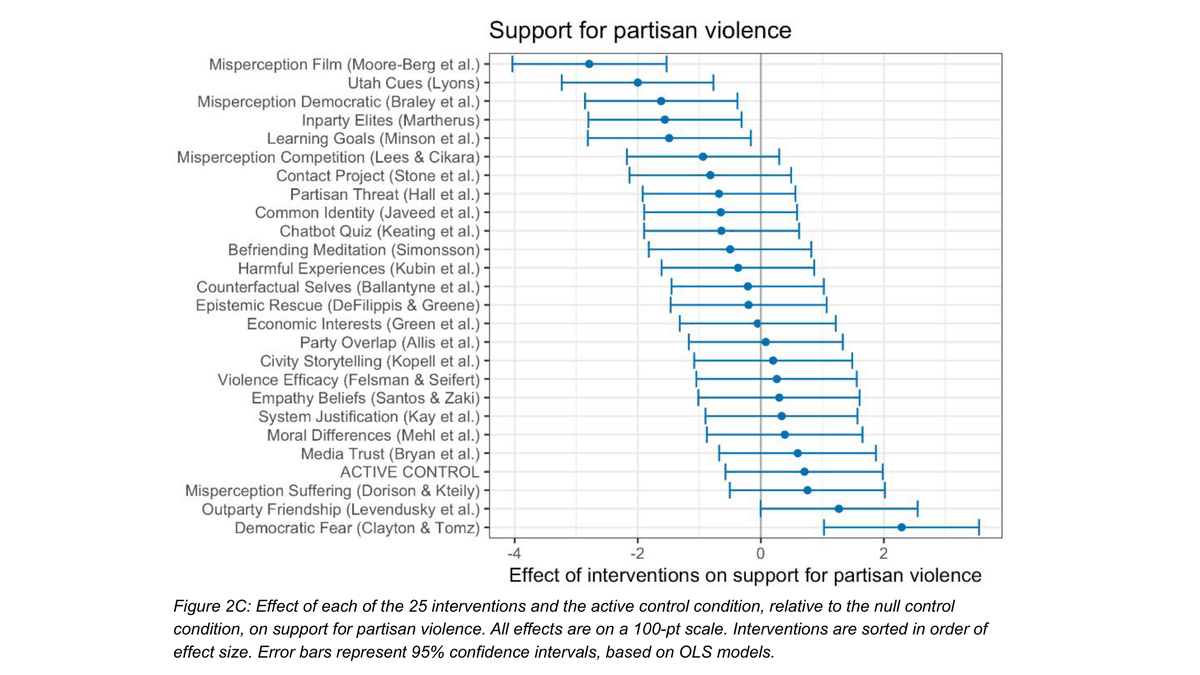
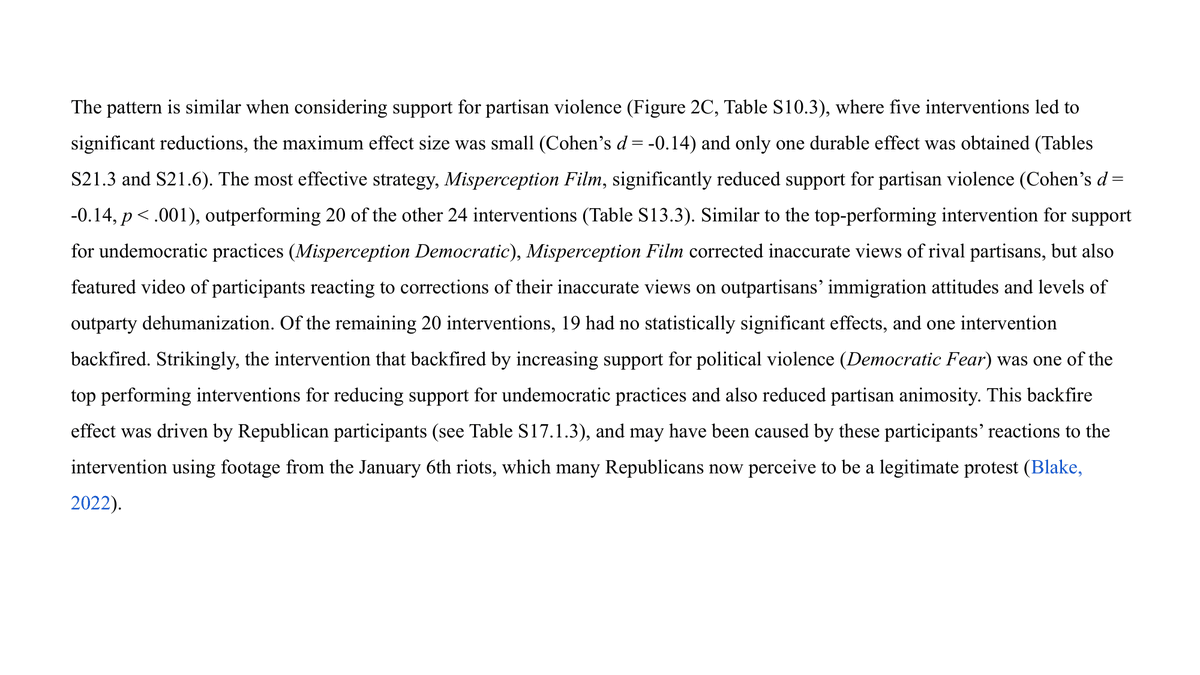
When we designed the challenge, we realized how little we actually know about how connected the many important political attitudes are.
Using effect sizes from the many interventions on the many outcomes we collected, we can shed unique light on this question.
Using effect sizes from the many interventions on the many outcomes we collected, we can shed unique light on this question.
We find:
➤Partisan animosity is largely driven by other factors than support for undemocratic practices or partisan violence.
➤Partisan animosity is driven by similar factors as biased evaluation of politicized facts and general social distrust.
➤Partisan animosity is largely driven by other factors than support for undemocratic practices or partisan violence.
➤Partisan animosity is driven by similar factors as biased evaluation of politicized facts and general social distrust.
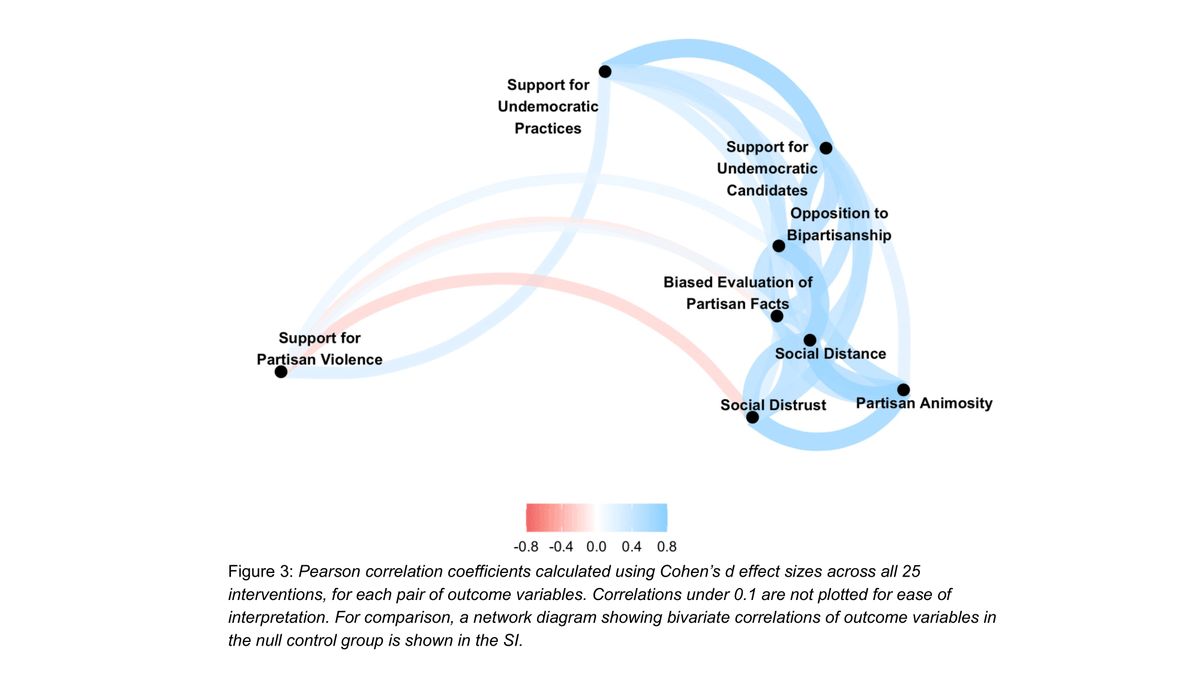
Spotlight: Support for undemocratic candidates
Combination of how much voters endorse undemocratic practices, and how much they despise rival partisans - most effective interventions for reducing SUC are the top 2 for interventions for reducing SUP and top 4 interventions for PA
Combination of how much voters endorse undemocratic practices, and how much they despise rival partisans - most effective interventions for reducing SUC are the top 2 for interventions for reducing SUP and top 4 interventions for PA
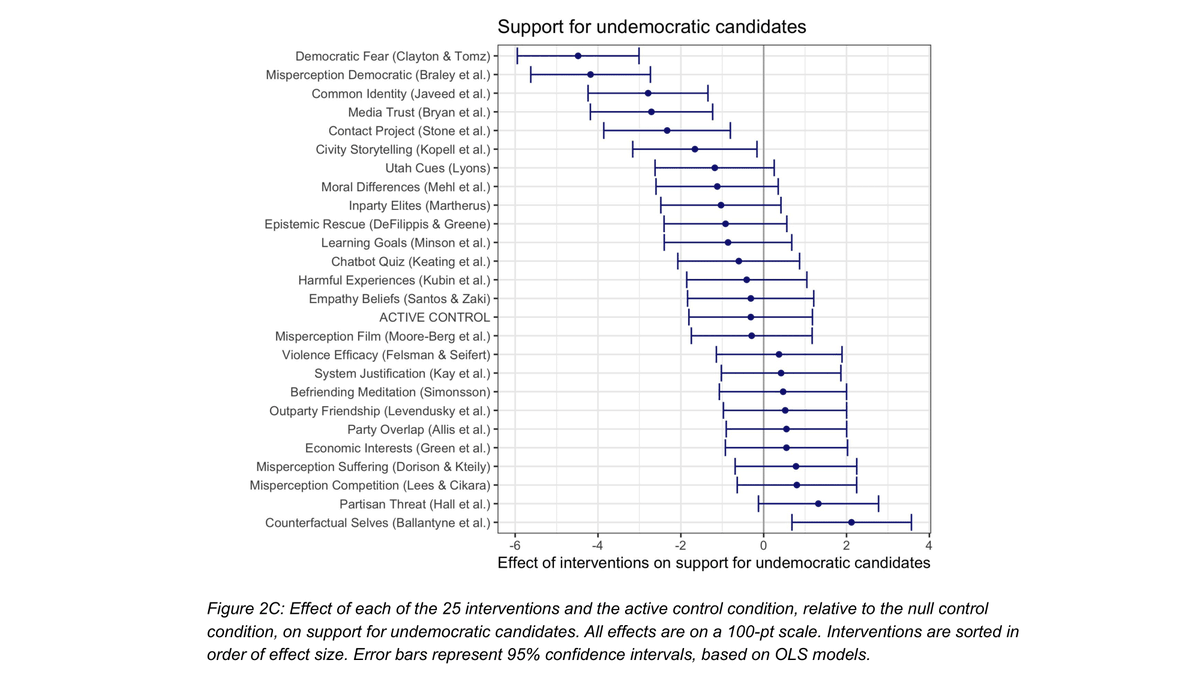
Overall, our results provide a toolkit of promising interventions for practitioners & shed new theoretical light on challenges facing American democracy. Problematic attitudes are related in complex ways, and effectively treating them requires understanding those relationships!
This project was a true team effort. Major thanks to the leaders of the project: @jgvoelkel, Nick Stagnaro, and @jchu1225. And huge kudos to Sophia Pink, Joe Mernyk, Chrystal Redekopp, Jamie Druckman, & @DG_Rand for their brilliance and hard work.
Great admiration and respect to the developers of these brilliant interventions!
@AliaBraley; @GabeLenz; @_dval_; @hosinux; @alex_pentland @ActiVoteUS; Victor Allis; @erezyoeli; Sara Gifford @malkako; Palma Strand; Gina Baleria; Maya Fiorella; Aaron Kay; @JohnJost1
@AliaBraley; @GabeLenz; @_dval_; @hosinux; @alex_pentland @ActiVoteUS; Victor Allis; @erezyoeli; Sara Gifford @malkako; Palma Strand; Gina Baleria; Maya Fiorella; Aaron Kay; @JohnJost1
@JamesMartherus Otto Simonsson Peter Felsman Colleen Seifert @ba_lyons @d_f_stone; @introvertdev; @mmfranz; @JuliaMinson
@Leesplez @profcikara Caroline Mehl; Mylien Duong; @mac_cw; @laurenralpert @katie_clayton14 Michael Tomz @ProfMattHall; @wzcmarsh; Levi Allen @jameskirk_14
@Leesplez @profcikara Caroline Mehl; Mylien Duong; @mac_cw; @laurenralpert @katie_clayton14 Michael Tomz @ProfMattHall; @wzcmarsh; Levi Allen @jameskirk_14
Daniela Goya-Tocchetto; @JuliaMinson; Hanne Collins; @CharlieDorison; Molly Moore; @HHBlunden; Kara Luo; @luiza_a_santos; @zakijam
@m_levendusky; @nathanballan @JaredCelniker @MertcanGungor_ @jmkelly91 @shiri_spitz @alijaveed_; @kim_doell; @steverathje2; @jayvanbavel
@m_levendusky; @nathanballan @JaredCelniker @MertcanGungor_ @jmkelly91 @shiri_spitz @alijaveed_; @kim_doell; @steverathje2; @jayvanbavel
@Grienstien23, @nick_r_kay, @azimshariff
@DeFilippisEvan; @MoralityLab
@brandynkeating; Aaron Lyles; Jay Rosato
@emily_kubin, @CurtisPuryear, @kurtjgray
@CharlieDorison; @NourKteily @smooreberg; @MikeyPasek; @reblitt; @RomanGallardo_
@DeFilippisEvan; @MoralityLab
@brandynkeating; Aaron Lyles; Jay Rosato
@emily_kubin, @CurtisPuryear, @kurtjgray
@CharlieDorison; @NourKteily @smooreberg; @MikeyPasek; @reblitt; @RomanGallardo_
@chrisjb1; Cameron Hecht; Maytal Saar-Tsechansky; David Yeager; Mac Clapper
Many thanks also to the members of the advisory board
Mannie Ajayi; @chris_bail; @lcbe; @AdamBerinsky; @BizzaroPolitix; @LongDoan; @CoreyDFields; @EliDFinkel; Matt Gentzkow; @CherylGraeve; @KristinJHansen; @Eszter; Vincent Hutchings; @LucasLJohnson; Cindy Kam; @AdamSethLevine
Mannie Ajayi; @chris_bail; @lcbe; @AdamBerinsky; @BizzaroPolitix; @LongDoan; @CoreyDFields; @EliDFinkel; Matt Gentzkow; @CherylGraeve; @KristinJHansen; @Eszter; Vincent Hutchings; @LucasLJohnson; Cindy Kam; @AdamSethLevine
@namalhotra; @LilyMasonPhD; @LeslieMcCallgc; @profmichelson; @JenanMohajir; Mohammed Naeem; @Mara_PhD; @Zeenat; Jaime Settle; Jesse Shapiro; @BetsySinclair1; @michtorresp; @julie_wronski
Thanks as well to our funders for making the project possible - @civichealthproj; @FetzerInstitute; @stanfordimpact; @StanfordPACS - and to the good folks at @ForthrightPanel for fielding the study.
Last but not least, thanks to others whose work inspired our work and/or who offered critical feedback that helped us: @dbroockman @LilyMasonPhD @NathanKalmoe @j_kalla @LindaSkitka @SamaraKlar @m_levendusky @BrendanNyhan @seanjwestwood @ylelkes @LarryDiamond @RachelKleinfeld
@msalganikl @hakeemjefferson @dziblatt @JonHaidt @Mike_AFL @grahammt @MilanSvolik @Sakiera_Hudson @AdamBerinsky @civichealthproj @ListenFirstProj @amandaripley @ezraklein and many, many others...
One-stop shopping for resources related to the Strengthening Democracy Challenge (press release, paper, details of interventions, etc.) on our website:
strengtheningdemocracychallenge.org
strengtheningdemocracychallenge.org
H/t to @katy_milkman @angeladuckw @BrianNosek @OSFramework @PsySciAcc @CalvinKLai @ChangeBcfg @kairuggeri @FukuyamaFrancis @AustinVanLoon
• • •
Missing some Tweet in this thread? You can try to
force a refresh



